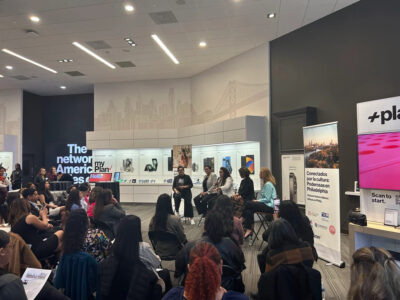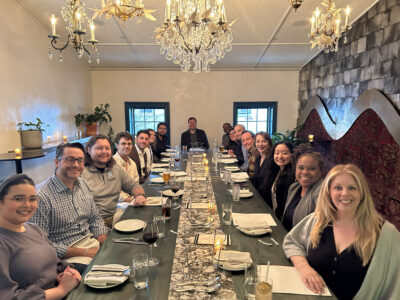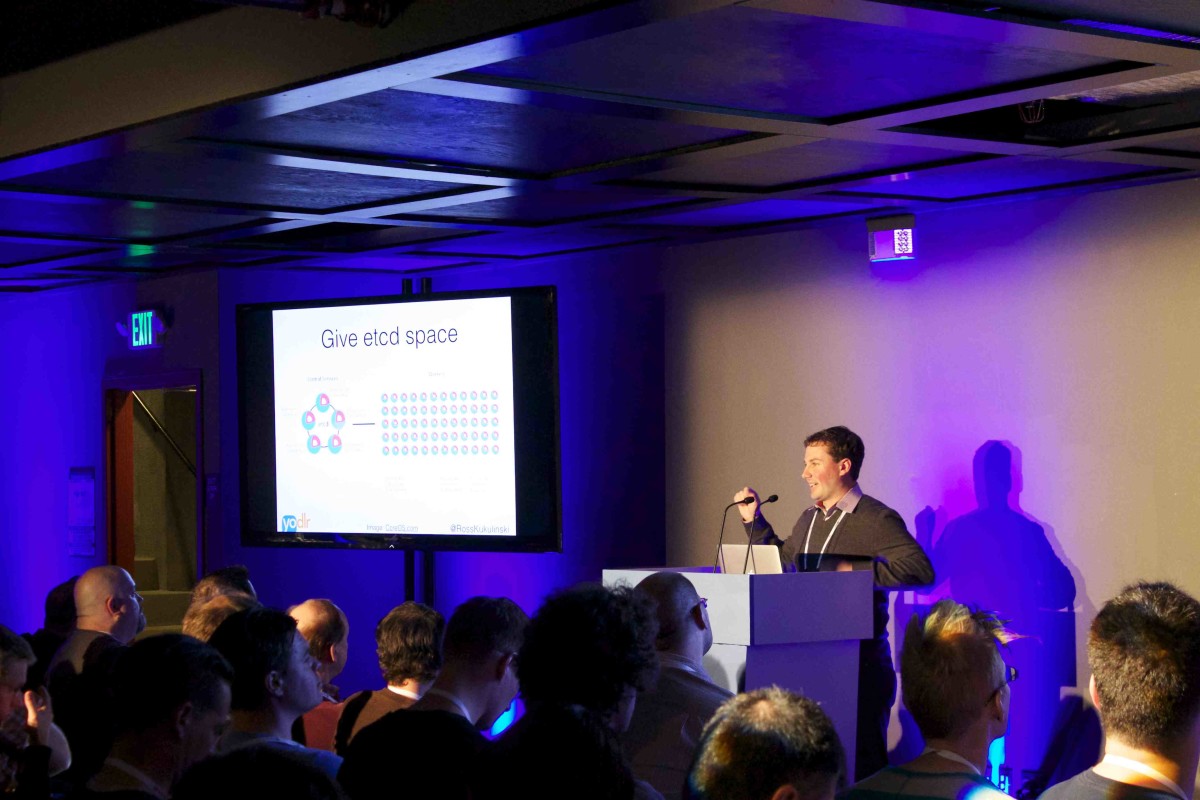Just as his remote communication startup is finding its product fit, Ross Kukulinski is leaving his two cofounders in Silicon Valley behind.
Kukulinski, 29, is heading to Philadelphia — Washington Square, to be exact — because of his wife’s new, post-doctoral research position at Temple University.
It’s not a big issue, Kukulinski said. He’ll build the company, Yodlr, from his new home.
His cofounders always knew he was going to move for his wife’s job. Plus, Yodlr’s in the business of remote communication. So the team will eat its own dog food, so to speak, now more than ever. (We’ve heard a similar case for remote teams from Jonathan Frankel, CEO of video communication startup Nucleus, whose team is distributed between Israel and the U.S.)
In an interview on our public Slack, we talked to Kukulinski about how his startup came to life, the meetup groups he wants to start here and how everyone in Philly is just so much friendlier than in Silicon Valley.
Oh, and if you’re not a member of our Slack yet, get an invite here.
###
Ok, so Ross, set the scene for us — where are you right now?
Right now I’m living in Palo Alto — right in the heart of Silicon Valley. My wife and I are here for another month or so, then we’ll be driving across the country to Philly. We’re moving into our new place Jan. 1.
Whoa, why’d you decide to drive?
A couple of reasons. In 2011, when I moved from D.C. to California, my (then girlfriend-now-wife) drove across the country for an adventure. We really enjoyed that experience and wanted to do it again … this time in reverse.

(Screenshot)
So why are you moving to Philly?
Well as I mentioned, my wife just finished up her Ph.D. here at Stanford, and she’s accepted a post-doc research position at Temple. It’s a 2-year gig, after which she’ll probably go on the professor job market. I’m along for the ride!
What’s her field?
Her research spans education and psychology. Specifically, she’s interested in how people learn and recognize patterns. Her dissertation research was focused on how materials presented to learners effected their ability to learn. To be perfectly honest, I don’t fully grasp all the nuances of her work. If people are curious to learn more, I suggest they visit her Stanford page or her website.
Was there ever a possibility that you would stay in Silicon Valley to run your startup?
Yes, there definitely was a possibility of remaining in Silicon Valley where my two cofounders for Yodlr live. But I firmly believe that family always comes first. In this case, we’re kind of lucky. Yodlr is a tool to help people communicate remotely. So now we can eat our own dogfood multiple times a day.
We’ve seen a lot of tech people relocate here because of their partners’ jobs, often medical-related, like Amit Rao, a Mint.com developer who moved because of his wife’s medical residency. It’s like this hidden gem of talent attraction to Philly.
There’s so many great universities and medical groups in Philly, I’m not surprised at all!
Tell us more about Yodlr. What stage is the company at now? How many employees?
Yodlr has really just recently found our product fit — and before that, worked out all the technical problems of doing real-time VoIP in the browser without plugins, downloads, or user accounts.
Now we’re growing our user base, exploring pricing models, and planning our next stage of growth. Currently the team is 3 people — myself and two cofounders. We’ve also got a part-time contractor who’s helping with our upcoming iOS application.
Is that the product, real-time VoIP in the browser?
In short, yes. We spun out of a company that builds real-time sound and VoIP products for flight simulators and military training. Before the spinout, we were the “Labs” or future-tech team tasked with exploring new and innovative technologies, and then evangelizing them back to the parent company.
We were a remote team, and the parent company had a growing number of remote employees. We tried all of the other team communication products and weren’t happy with any of them. So my team did a 3-week sprint and build a prototype browser-based VoIP application using the backend systems of the parent company.
We used that project, code-named “yakkity” internally for a while, and everything was great. But then we started using it for meetings regarding open-source work, customer discussions, sales discussions and a number of the people we were talking with asked who made it, and could they buy it.
So we rebranded as Yodlr and spun the “Labs” team off into a new company focused on building the most efficient remote meeting/presentation platform.
Do you still have any ties to the company? That’s Advanced Simulation Technology Inc., right? Like do they own any of the IP or have equity in it?
Yep! We’re still very close with ASTi. They have equity in Yodlr and we have worked out dual-licensing agreements that makes everyone happy. They’re also obviously a customer!
What did your cofounders think about you moving?
Well, it wasn’t probably the giant shock that you might think. My moving away has always been in the cards — it was just a question of when, not if. Obviously we’re going to miss seeing each other every day, getting meals, hanging out. I’ll be coming back occasionally, but we’ve been toying with the idea of going entirely virtualized for a while now. We’ve seen how successful Buffer (and others) have been with a distributed team.
That said, would you consider building a team here at all?
Oh definitely. In a lot of ways, I think you have to be crazy to launch a startup in California. Everything is so expensive here.
My wife and I were in Philly apartment shopping last week and I dropped by the Philly CocoaHeads post-meetup drink-up. I had a great time meeting new people (so friendly!) and there’s obviously some extremely talented folks in Philly.

(Screenshot)
Finally, I’m very active in the Kubernetes, CoreOS, Docker ecosystems and eager to get involved/start groups for them.
Re: PhillyDev Slack, is there anything like that in Silicon Valley?
Not that I’m aware of. SV is a funny place. There’s really 3-4 vastly different communities in a small space. You’ve got SF, Oakland, Silicon Valley, and San Jose. There’s not a whole lot of crossover between the dev communities in each one. SF has its own NodeJS meetup (2 or 3 actually). SV/SJ have BayNode. And Oakland has its own.
So I was really happy when I stumbled upon PhillyDev slack. I just can’t get over how friendly people in Philly have been to us. It’s awesome.
Heh. Is it not like that in SV?
Not to the same degree. Don’t get me wrong — I’ve made a lot of friends in SV. But Philly folks just seem to go the extra step in welcoming people.
It’s funny one of our biz dev staffers said to me today that people in Delaware (we’re hosting Delaware Innovation Week right now because we also run Technical.ly Delaware) are so nice and friendly whereas in Philly, people try to bring you down and figure out what you did wrong. But I don’t agree with him! Haha.
Interesting. I mean, maybe I’ve just gotten lucky with the first 20 people I’ve met … but I don’t think so

(Screenshot)
I definitely want to start a group related to container-based deployments. Not tied to any specific technology especially since it’s such a young area.
What are container-based deployments?
Oh, yes. So container-based deployments means deploying applications for the web using “containers.” The one container platform most people would have heard of is Docker.
I don’t want to go too in depth (I just released an O’Reilly video course on deploying container apps on CoreOS) but I’m of the opinion that containers are the future of shipping applications. Or if you’re Google, its the past, present, and future. They’ve been using containers for 10 years now … the rest of us are just catching on.
I know there’s a Philly Docker group but I haven’t stumbled upon a more general container group — Kubernetes, Mesos, CoreOS, Docker, etc. I’ve lined up some corporate support from here in CA that are eager to get a group like that organized in Philly … its now just a question of finding other people interested in those topics.
And if anyone wants to get in touch with me — they can find me @rosskukulinski on Twitter 🙂
Have you settled on a neighborhood to live in?
We have! We’re going to be on the edge of Washington Square & Society hill. Quiet neighborhood, but easily walkable to fun things to do. That’s something else that should be said for Philly — it’s great city to walk.
Oh nice, you’ll have to come visit our office. We’re right next to Washington Square Park at the Curtis Center at 6th and Walnut. Are you gonna join a coworking space? Or work from home?
Oh, great question. The plan right now is to work from home most days … but I do plan on getting a membership at one of the coworking spaces
Cool, we have many.
Yes — I’ve visited that page before. I think there’s only one that’s dog-friendly … so that’s likely where I’ll end up.
Join the conversation!
Find news, events, jobs and people who share your interests on Technical.ly's open community Slack

Philly daily roundup: A better coffee supply chain; Philly Tech Week returns; Apply to Pennovation Accelerator

Philly daily roundup: Startups want office culture; New Venture Lab cohort; Penn Med's new AI leader

What AI means for the future of SaaS: Reality vs. hype

